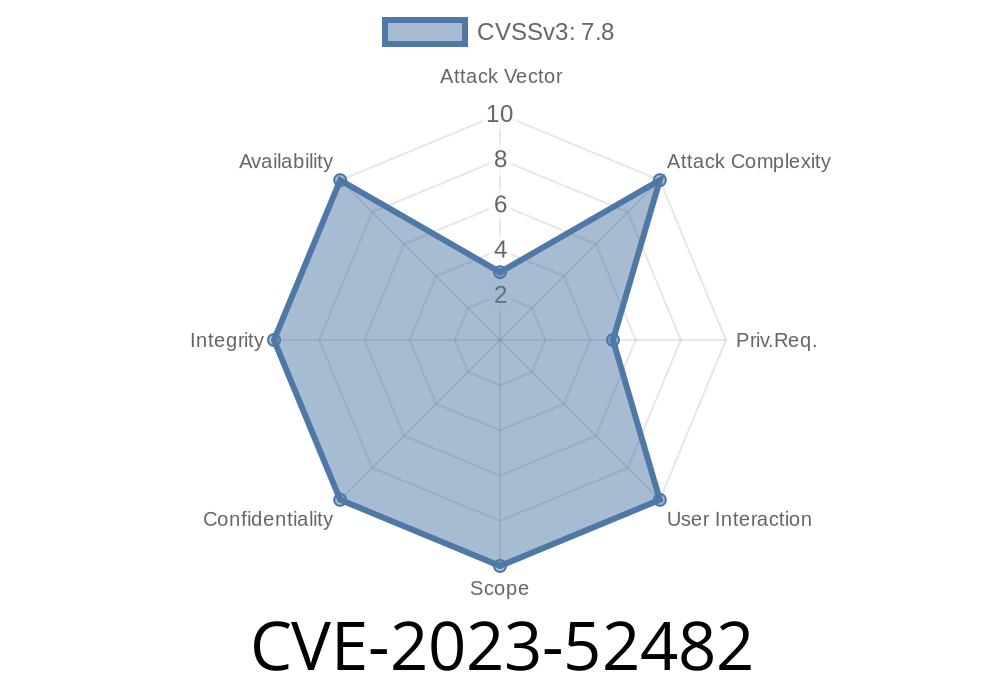---
Introduction
In early 2024, security researchers and the Linux kernel team addressed a new hardware-level vulnerability affecting users of Hygon x86 processors. Dubbed CVE-2023-52482, this issue is related to what is known as a _speculative return stack overflow_ (SRSO). In this exclusive post, we’ll break down what SRSO is, how it affects Hygon CPUs running Linux, and the mitigation that was added in the kernel. We'll even look at a sample exploit and how code patches work—all in simple, straightforward language.
What is SRSO (Speculative Return Stack Overflow)?
Modern processors use speculative execution for speed. This means CPUs might "guess" the results of some calculations before actually knowing them, to keep the pipeline full and fast. However, speculation can open the door to data leaks.
The *return stack buffer* (RSB) is a small CPU structure that helps the processor predict where to return after a function call (“return” in programming). If an attacker can overflow or manipulate the RSB, they can cause the CPU to speculate incorrectly—and potentially access privileged memory, as shown in earlier vulnerabilities like Spectre and Retbleed.
SRSO (Speculative Return Stack Overflow) is when such overflow leads to speculative execution of attacker-chosen instructions, possibly leaking secrets through side channels.
Why Hygon Processors Matter
Hygon is a brand of x86 CPUs used mainly in China, based on AMD technology. Previous mitigations for SRSO focused mostly on AMD and Intel. Researchers and kernel maintainers recently found that Hygon chips are also vulnerable.
A typical attack would involve causing the stack buffer to overfill, so the next return addresses guessed by the CPU could be attacker-controlled—possibly just pointers back to code under attacker control.
The Discovery and Resolution
Developers added a specific patch to the Linux kernel to mitigate this for Hygon chips. Here’s the official commit introducing the mitigation:
- x86/srso: Add SRSO mitigation for Hygon processors
The fix is included in Linux kernel versions 6.1.75, 6.6.14, 6.7.2, and later.
Example: What Could an Exploit Look Like?
Let's walk through the risk with a theoretical simplified code example. (Actual, direct weaponization would require much deeper CPU knowledge and would be unethical to post. Instead, here’s a demo of how an attacker might try to pollute the RSB and trigger speculative access:)
// C-like pseudocode showing RSB manipulation on a vulnerable Hygon CPU
void attacker_controlled_function() {
// Create deep call stack frames to overflow RSB
for (int i = ; i < 64; ++i) {
recursive_function();
}
// RSB is now filled/polluted with return addresses
victim_function(); // When this returns, CPU may speculate to attacker code
}
void victim_function() {
// code accessing sensitive information
secret = privileged_mem[];
// if return address is attacker-controlled, secret may be leaked speculatively
}
The core idea: After overflowing the RSB through deep call/return tricks, an attacker may influence the next return’s prediction, causing speculative execution paths to instructions under their control. This could potentially leak privileged info through side-channels.
The Kernel Patch: How mitigation works
To fix this, Linux now flushes or refills return stacks on context switches or just before executing sensitive code paths, _only_ on CPUs known to be affected by SRSO—now including Hygon.
Here’s a simplified snip from the Linux kernel patch for reference
// Kernel code (simplified) enabling the mitigation automatically
if (boot_cpu_data.x86_vendor == X86_VENDOR_HYGON)
setup_force_cpu_cap(X86_BUG_SRSO);
// This ensures that protective "RSB stuffing" code is run at sensitive times
Full details are visible in the commit
What Should Users and Sysadmins Do?
1. Upgrade Your Kernel: If you’re on a Hygon CPU (or an AMD CPU), you should update to Linux kernel 6.1.75, 6.6.14, 6.7.2, or newer.
Check for SRSO Mitigation: Run dmesg | grep SRSO to see if the mitigation is enabled.
3. Deploy Regular Security Updates: SRSO-type vulnerabilities are found across multiple vendors, so timely updates are always a must.
References and Further Reading
- CVE-2023-52482 on NVD
- Linux Kernel Patch
- Spectre & Retbleed: What are microarchitectural side-channels?)
Final Thoughts
CVE-2023-52482 is another reminder that hardware-level bugs can be both subtle and dangerous. The Linux team’s fix ensures Hygon CPU users are not left exposed, but you need to update your operating system to stay protected.
Stay aware, apply updates, and keep secure! If you want even more detail on the technical aspects of SRSO or the Linux mitigation, check out the links above.
Got more questions about SRSO or Linux kernel security? Sound off below!
Timeline
Published on: 02/29/2024 06:15:46 UTC
Last modified on: 01/13/2025 18:27:10 UTC
